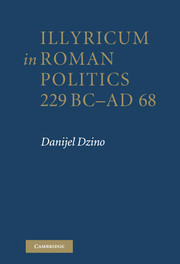Book contents
- Frontmatter
- Contents
- List of figures
- List of maps
- List of tables
- Acknowledgments
- Timeline
- 1 Introduction, approaches, review of sources and secondary literature
- 2 Illyricum in Roman foreign affairs: historical outline, theoretical approaches and geography
- 3 Roman trans-Adriatic engagement (229–168 BC)
- 4 Rome across the Adriatic in the late Republic (167–59 BC)
- 5 The construction of Illyricum: Caesar in Illyricum and the Civil Wars (59–44 BC)
- 6 Octavian in Illyricum
- 7 From senatorial to imperial Illyricum: Bellum Pannonicum
- 8 The failure of Greater Illyricum: the Bellum Batonianum
- 9 Iulio-Claudians in Illyricum: the tale of two provinces
- Conclusion: the construction of Illyricum in Roman political discourse
- Bibliography
- Index
2 - Illyricum in Roman foreign affairs: historical outline, theoretical approaches and geography
Published online by Cambridge University Press: 05 May 2010
- Frontmatter
- Contents
- List of figures
- List of maps
- List of tables
- Acknowledgments
- Timeline
- 1 Introduction, approaches, review of sources and secondary literature
- 2 Illyricum in Roman foreign affairs: historical outline, theoretical approaches and geography
- 3 Roman trans-Adriatic engagement (229–168 BC)
- 4 Rome across the Adriatic in the late Republic (167–59 BC)
- 5 The construction of Illyricum: Caesar in Illyricum and the Civil Wars (59–44 BC)
- 6 Octavian in Illyricum
- 7 From senatorial to imperial Illyricum: Bellum Pannonicum
- 8 The failure of Greater Illyricum: the Bellum Batonianum
- 9 Iulio-Claudians in Illyricum: the tale of two provinces
- Conclusion: the construction of Illyricum in Roman political discourse
- Bibliography
- Index
Summary
ROMAN FOREIGN AFFAIRS: AN OVERVIEW OF MECHANISMS AND TOOLS
The scholarship on Roman foreign relations, especially the process of Roman expansion and its impact on their understanding of the space they were conquering, is voluminous. Recently, emphasis was laid on Roman perceptions and misconceptions of space, their cognitive mapping of the ‘grossly distorted universe’ in which they lived. It was shown that Roman perception of space was directly related to the way they applied and organised their political and military power. The Romans perceived space in their political geography in two ways: as the space which was defined, measured, organised and administered and on the other hand, space that was dominated only through political power, but not formally administered. However, their political theory was used to unite both perceptions of space so that the imperium of the magistrate was applied and understood as either ‘power’ or ‘administration’, i.e. as ‘empire’. This is further reflected in the ambiguity of the word provincia, relating at the same time to the power of the magistrate over non-organised space, and the province as an organised space with definite frontiers, which we are more familiar with.
In fact, it seems that the way Roman power was projected over a certain space influenced their perception of that space. Claval argues that power has a geographical dimension but not a geographic continuum for the Romans – non-administered lands are not imagined as geographical areas with natural limits, but as spaces defined by the existence of those who inhabit them and which are not controlled by Roman power.
- Type
- Chapter
- Information
- Illyricum in Roman Politics, 229 BC–AD 68 , pp. 18 - 43Publisher: Cambridge University PressPrint publication year: 2010



